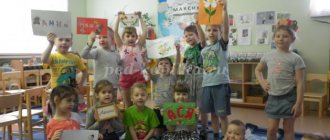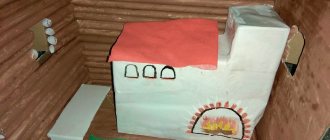Self-education topics for kindergarten teachers according to the Federal State Educational Standard for different groups
The teacher chooses a topic for self-education, taking into account his individual experience and level of professional development. It should always be aimed at some specific result, raising the process of education and training to a qualitatively new level.
The methodologist should not rush to impose a topic on the teacher: in a personal conversation, he finds out which aspects are most interesting to the teacher and what is difficult for him. The chosen topic should be relevant, and the work on self-improvement should organically integrate into the pedagogical process of the entire preschool institution.
Sometimes it is allowed to unite several teachers of one kindergarten to work on one topic, especially if its content is close to one of the tasks of the annual plan of the entire preschool institution. Another option is if the organization is preparing for innovative or experimental activities.
Summarizing the above, we can identify the following areas of focus for self-education:
- any of the current annual tasks of the preschool organization;
- a question that causes difficulties for the teacher;
- deepening knowledge and expanding existing teacher skills.
In addition, the topic must be chosen taking into account the age characteristics of the group of preschoolers with whom the teacher works. For example, the following topics will be relevant for a teacher of a nursery and second junior group:
- Introduction of interactive methods into the educational process in kindergarten.
- Innovative methods of early development.
- Integrated classes in the junior group: aspects of preparation and methodology.
- Environmental education of children three to four years old.
- Raising children using oral folk art in the educational process in early preschool age.
- Development of cognitive activity of junior preschool pupils.
- Nature is a means of educating younger preschoolers.
- Non-traditional drawing techniques in working with younger preschoolers.
- Development of mathematical concepts in younger preschoolers.
- Formation of key self-care skills in younger preschoolers.
- Development in the second younger group of ideas about inanimate nature (various natural phenomena, seasonality, times of day).
- Formation of key cultural and hygienic skills in younger preschoolers.
Middle group:
- Theatrical activities.
- Formation of desire for a healthy lifestyle in preschool children.
- Emotional and personal sphere of pupils of the middle group of preschool educational institutions.
- Speech development is an effective means of understanding the world around us.
- Non-traditional drawing techniques in the classroom.
- Cultivating curiosity (in the process of communication, classes, play and work activities).
- Development of various forms of communication when working with secondary group students.
- Development of coherent speech in middle group students (in the process of communication, play and work activities).
- Development of cognitive activity using mathematics.
- Methods of teaching middle group students to expressively read poems.
Senior group:
- Development of coherent speech in senior group students.
- Artistic and aesthetic development of older preschoolers through the national-regional component.
- Didactic game as a means of speech therapy work in the senior group.
- Using a student-centered model in teaching older preschool children.
- Formation of ideas about their small homeland among pupils of the senior group.
- Teaching children five to six years old basic analysis of a literary work.
- Traditional drawing techniques in classes with older children.
- Techniques for developing safe life skills in the senior group.
- Teaching senior group students how to retell works of fiction.
Preparatory group:
- The process of teaching literacy in the preparatory group.
- Development of ecological culture of older preschoolers.
- Fundamentals of moral education.
- Formation of cognitive activity and verbal communication through familiarization of kindergarten students with a foreign language.
- Legal education of pupils.
- Non-traditional drawing techniques in classes with students.
- Formation of prerequisites for educational activities among students.
- Familiarization of pupils with the biocenosis of forests, fields, meadows, and reservoirs.
- Formation of students' ideas about space.
- Using health-saving technologies when working with students.
- Continuity between kindergarten and school.
- Teaching creative storytelling in speech development classes in a preparatory group.
Examples of topics for a senior teacher:
- Organization of the educational process in the context of the implementation of the Federal State Educational Standard.
- Interactive forms and methods of work of the methodological service as a factor of successful professional competence in the context of the introduction of the Federal State Educational Standard for Preschool Education (preschool education).
- Increasing the professional level of teachers in the use of modern pedagogical technologies in the education and development of students through group forms of methodological work.
- Professional competence of a preschool specialist in the context of the implementation of the Federal State Educational Standard.
- An innovative approach to creating a developmental environment in a preschool institution.
- Improving the quality of education aimed at individualizing the development of students, taking into account the introduction of the Federal State Educational Standard.
- Pedagogical diagnostics in kindergarten.
- Psychological and pedagogical assistance to the family.
- Computer technologies: application in preschool education.
- Ways to create psychological comfort in a group.
- Environmental education of preschool children.
- The importance of an individual approach in preschool care and education.
Self-study notebook with notes in the margins
Having determined the “basis” for yourself, as you read further these books, you write out for yourself: forms (forms of organizing the educational process: individual, pair, group, frontal), methods (methods of pedagogical activity). I advise you to read a textbook on pedagogy for pedagogical schools, author Smirnov (I don’t remember his name and patronymic right now), year of publication - after 2000, but no one has yet described the methods and techniques of pedagogical activity better than him. Just don’t take the classification of methods by Yu.K. Babansky. I have a great attitude towards him, but he died in 1985 (23 years ago!!!! :() and during this time his classification has simply become outdated. With Babansky’s classification you will not be able to model your professional informatization activities competently, in a modern way), means , conditions. You see, I have already sketched out a 5-point plan for you. At each point, you choose for yourself those that you understand, accept and are able to implement. I didn’t say the main thing at first: in order to take on the topic of informatization, you need to take INFORMATICS. Otherwise, you need to link to the following topic of self-education: “Elimination of computer illiteracy.” Don't be surprised - this is a very good topic!
(to be continued)
Scheme for planning work on self-education. Another option
Planning of self-educational work (scheme) Individual self-education plan for _____year Teacher ____________________________________ Direction of the circle___________________________ Full name _____________________________________ Education (when and what educational institution did you graduate from) __________ When did you take courses _____________________ What literature does you study during the year ________ Where and when did you speak on the topic? ___________________ Self-educational work on the topic: 1. Topic CTDM. 2. Individual topic of self-education. 3. When work on the topic began. 4. When is it expected to finish working on the topic. 5. Goals and objectives of self-education on the topic. 6. Main issues planned for study. Stages of material development. 7. Literature on the topic, by year. 8. Whose experience is expected to be studied on this topic. 9. Creative cooperation on the topic of self-education. 10. Practical outputs (reports, abstracts). 11. Study of best practices (how many lessons and extracurricular activities attended). 12. When and where did he give a report on his own teaching experience? 13. Conclusions at the end of the work.
Having built a “theory” of the problem for yourself, begin to implement it on your favorite topic of ONE lesson. If you have several classes in parallel (a teacher’s dream!!!!), then in the first year of your self-education (and your mini-research) you will be able to test your FIRST achievements in ONE class, comparing the results obtained (children’s learning). Those. You will have one class as a control class (you work as usual), and the other as an experimental class. The most acceptable way to check the results: give the same measures (for example, tasks, examples). In this case, you need to pay attention: classes are always different in their abilities. Experiment in a weak class!!! (This is the rule of pedagogical science: achieve good results in a weak class!). Then reflect on the results obtained very honestly for yourself. Record everything (graphs, questionnaires, etc.). Of course, there will be a need to redo something, add something, etc. And again - record (what was changed, why, what was replaced). And throughout the next year, engage in “self-education”: read, read and read on your problem “Informatization”, including articles from pedagogical journals (fortunately, there are now a lot of electronic ones), articles from scientific and practical conferences (unfortunately, teachers they are not read at all, but they contain the most valuable new experience!!!).At this stage, it would be very great if you got acquainted with the work experience of your colleagues (in the educational institution, district, city, Russia) on this problem (how to do this, I think there is no need to explain). And keep thinking and thinking: what needs to be done for a perfectly informatized favorite lesson! In the second year, teach your favorite topic in a new way. And again - a cross-section of learning skills (if you use the same diagnostic tools: tasks, examples, then you will very easily see “growth over growth”!. That is, a comparison of work both in the old and in the new way: You teach children (“growth”), but innovation should (or maybe not) lead to the better (“growth”!) If this happens, “a medal on your chest and a monument during your lifetime!” So, your topic is self-education "works" positively! And then, the next year, you "expand" the area of the experiment: take two lessons, a whole topic. And that's enough!!! Believe me, I've seen more than a dozen candidate dissertations "done" on one topic . I think you understand: the topic is in one class, for example, in the 5th. If there is a need, “expand in breadth,” but better “in depth.” Use other programs (we are talking about informatization), other tasks, introduce computer control knowledge and everything on your FAVORITE topic. And then: open classes (on this topic), seminars, master classes, etc. Of course, I have now very schematically given you not only the technology of self-education (maybe even to a lesser extent), but also recording its results. I think my recommendations will be useful.


